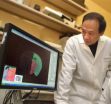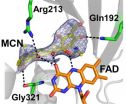(Press-News.org) WINSTON-SALEM, N.C. – Jan. 9, 2013 – New research from Wake Forest Baptist Medical Center shows that patients suffering from aggressive brain tumors can be effectively treated with smaller radiation fields to spare the rest of the brain and preserve cognition.
"For patients with glioblastoma, we now know we can safely and effectively treat them with smaller radiation fields to spare the rest of their normal brain," said lead investigator Michael D. Chan, M.D., assistant professor of radiation oncology at Wake Forest Baptist. "That's important because it lessens the symptoms from radiation toxicity like tiredness and nausea."
Chan said that a patient's cognition is related to how much normal brain is irradiated so focusing radiation on smaller areas of the brain may help preserve cognition and does not seem to lead to an increase in the likelihood of the tumor recurring. Overall, while long-term survival rates for glioblastoma multiforme patients have not improved by much with treatment advances, the ability to treat with smaller radiation fields preserves cognition and provides the possibility of better quality of life.
Recent research findings from Chan and colleagues appeared online last month ahead of print in the American Journal of Clinical Oncology. While there have been other similar studies, this one is the largest to compare smaller radiation margins to larger ones to document differences in patterns of failure for patients, Chan said. For this retrospective study, records for 161 patients treated at Wake Forest Baptist over the last 10 years were reviewed.
"We decided a few years ago that it would be worthwhile to look at whether using these tighter margins would affect the tumors coming back outside of the radiation field, or tell us if we are barely missing," Chan said. "We are the first to show definitively that people with smaller margins don't do any worse than those with larger margins."
Chan said that in the 1990s, Wake Forest Baptist's Edward G. Shaw, M.D., professor of radiation oncology, was part of a group that pioneered using smaller margins because it was less toxic. Smaller radiation margins around the tumor do not seem to lead to an increase in the tumor returning just outside of the radiation field, Chan said. A smaller radiation field, combined with modern treatment techniques, like newer chemotherapy agents and radiation technologies, provides physicians with more options.
"Treatments have gotten better over time and people with GBM may live longer than they had in the past. Our study found that the margins did not affect where the GBM came back or how long it took it to come back and it did not affect the overall survival," Chan said. "This could potentially be practice changing."
###
Co-authors include: Anna K. Paulsson, B.S., Kevin P. McMullen, M.D., Ann M. Pfeiffer, Ph.D., William H. Hinson, PhD., William T. Kearns, M.S., Annette J. Johnson, M.D., M.S., Glenn J. Lesser, M.D., Thomas L. Ellis, M.D., Stephen B. Tatter, M.D., Ph.D., Waldemar Debinski, M.D., Ph.D., and Edward G. Shaw, M.D., M.A., all of Wake Forest Baptist. END
Smaller radiation fields can spare brain when treating tumors, Wake Forest Baptist research finds
2013-01-09
ELSE PRESS RELEASES FROM THIS DATE:
Majority of Americans say new Congress should take immediate action to expand medical research
2013-01-09
Alexandria, Va.–January 9, 2013– America Speaks, Volume 13, a compilation of public opinion polls commissioned by Research!America, features timely data about Americans' views on issues related to biomedical and health research. A majority of Americans (72%) say the new Congress and the President should take action to expand medical research within the first 100 days of the 113th Congress. Public support for increased government spending on medical research holds particular relevance as Congress considers whether to further delay, eliminate or permit "sequestration," a ...
Hispanics leery of health care providers, often avoid cancer screenings, Moffitt study shows
2013-01-09
When researchers at Moffitt Cancer Center and colleagues conducted a random telephone survey among blacks, whites and Hispanics in New York, Baltimore and San Juan, Puerto Rico, they found that Hispanics are nearly twice as likely to report that fear of being used as a "guinea pig" and lack of trust in medical professionals contribute in being unwilling to participate in cancer screenings. The researchers concluded that health care providers need to do a better job of instilling trust and dispelling certain fears, particularly among Hispanics, to improve cancer screening ...
Eliminating useless information important to learning, making new memories
2013-01-09
AUGUSTA, Ga. – As we age, it just may be the ability to filter and eliminate old information – rather than take in the new stuff - that makes it harder to learn, scientists report.
"When you are young, your brain is able to strengthen certain connections and weaken certain connections to make new memories," said Dr. Joe Z. Tsien, neuroscientist at the Medical College of Georgia at Georgia Regents University and Co-Director of the GRU Brain & Behavior Discovery Institute.
It's that critical weakening that appears hampered in the older brain, according to a study in ...
Research: Bad news can spur strategic change in businesses
2013-01-09
CHAMPAIGN, Ill. — Negative media coverage may prompt firms to engage in greater levels of strategic change than previously thought, according to research by a University of Illinois business professor.
While businesses have typically viewed the news media as a megaphone for publicity, businesses have not viewed the media as an influential stakeholder capable of shaping the strategic decisions of key executives, says Michael K. Bednar, a professor of business administration at Illinois.
"As the news media reports negatively about firms, that registers with executives," ...
US health disadvantage spans age and socioeconomic groups
2013-01-09
WASHINGTON — On average, Americans die sooner and experience higher rates of disease and injury than people in other high-income countries, says a new report from the National Research Council and Institute of Medicine. The report finds that this health disadvantage exists at all ages from birth to age 75 and that even advantaged Americans -- those who have health insurance, college educations, higher incomes, and healthy behaviors -- appear to be sicker than their peers in other rich nations.
"We were struck by the gravity of these findings," said Steven H. Woolf, professor ...
Scientists use marine robots to detect endangered whales
2013-01-09
Two robots equipped with instruments designed to "listen" for the calls of baleen whales detected nine endangered North Atlantic right whales in the Gulf of Maine last month. The robots reported the detections to shore-based researchers within hours of hearing the whales (i.e., in real time), demonstrating a new and powerful tool for managing interactions between whales and human activities.
The team of researchers, led by Woods Hole Oceanographic Institution (WHOI) scientists Mark Baumgartner and Dave Fratantoni, reported their sightings to NOAA, the federal agency responsible ...
Drug resistance: 'Baby steps' can pay off big
2013-01-09
HOUSTON -- (Jan. 9, 2013) -- Rice University scientists have found that mutations of small effect can turn out to be game changers in the bacterial fight against antibiotic drugs.
The discovery came during an exhaustive, three-year effort to create a mathematical model that could accurately predict how specific mutations allow bacteria like E. coli to adapt to antibiotics like minocycline. The findings are detailed in a Dec. 10 study in the Proceedings of the National Academy of Sciences.
"As biologists, we tend to focus on big effects that result from big changes, ...
Hold the diet soda? Sweetened drinks linked to depression, coffee tied to lower risk
2013-01-09
SAN DIEGO – New research suggests that drinking sweetened beverages, especially diet drinks, is associated with an increased risk of depression in adults while drinking coffee was tied to a slightly lower risk. The study was released today and will be presented at the American Academy of Neurology's 65th Annual Meeting in San Diego, March 16 to 23, 2013.
"Sweetened beverages, coffee and tea are commonly consumed worldwide and have important physical—and may have important mental—health consequences," said study author Honglei Chen, MD, PhD, with the National Institutes ...
Study shows cognitive benefit of lifelong bilingualism
2013-01-09
Washington, DC — Seniors who have spoken two languages since childhood are faster than single-language speakers at switching from one task to another, according to a study published in the January 9 issue of The Journal of Neuroscience. Compared to their monolingual peers, lifelong bilinguals also show different patterns of brain activity when making the switch, the study found.
The findings suggest the value of regular stimulating mental activity across the lifetime. As people age, cognitive flexibility — the ability to adapt to unfamiliar or unexpected circumstances ...
Nobel laureate James Watson publishes novel hypothesis on curing late-stage cancers
2013-01-09
Cold Spring Harbor, NY – "Although mortality from many cancers has been steadily falling, particularly those of the blood [i.e., leukemias], the more important statistic may be that so many epithelial cancers (carcinomas) and effectively all mesenchymal cancers (sarcomas) remain largely incurable."
With these words as preface, Nobel laureate James D. Watson, Ph.D., in a newly published paper that he regards "among my most important work since the double helix," sets forth a novel hypothesis regarding the role of oxidants and antioxidants in cancers that are currently ...



